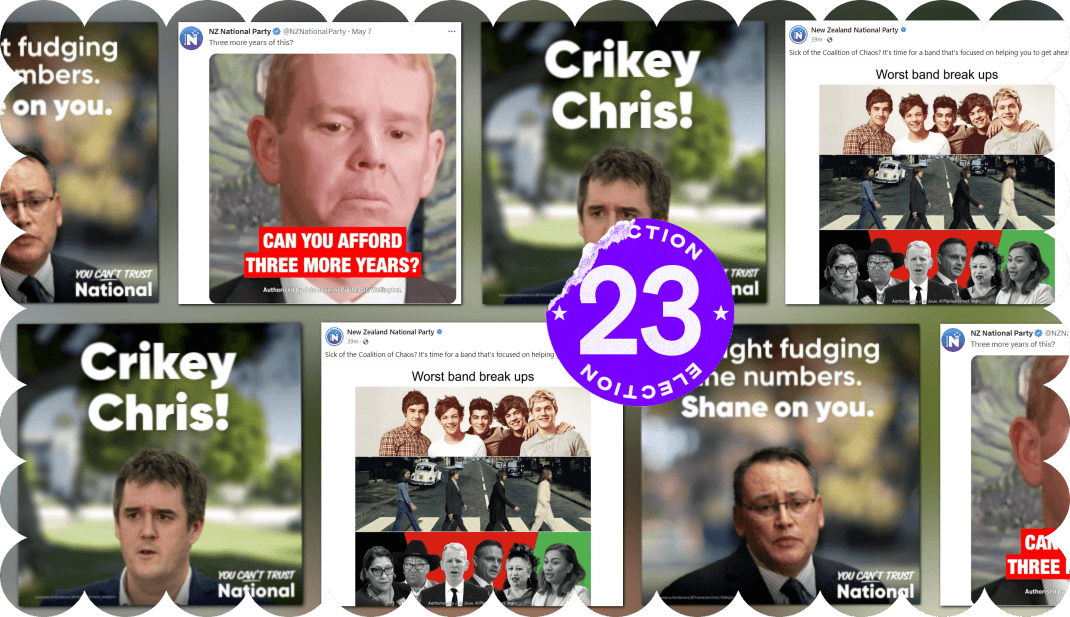From ‘Coalition of chaos’ to ‘Can’t trust National’, the narrative sculptors are hard at work, writes Toby Manhire.
As far as metaphors go, it was basic and it was effective. The blue team in sleek harmony, rowing like champions. The red team in a dinghy, with bits of green team thrown in – a shambles, rowing in different directions. The National Party was happy with its 2014 campaign ad, but happier still when the emergence of Kim Dotcom’s Internet Party forced a change in post-production: one of the rowers was painted purple.
“The ‘Laboureens’ boat ended up being used in our advertising much more than we intended, as the opposition campaign steadily appeared more and more like that boat,” Stephen Joyce, the party campaign chair, would later write.
Nine years on, but no longer the ship of government, National is rolling out a similar line, dusting off its own version of what John Key, in a more theatrical image, attacked as the “devilbeast” on the other side. The defection of a frustrated Meka Whaitiri from Labour to te Pāti Māori, combined with Elizabeth Kerekere quitting the Green Party amid an internal inquiry into her dealings with staff and MPs, inspired the coinage “coalition of chaos”.
“Coalition of chaos,” said Christopher Luxon, at least 20 times. “A week of chaos in parliament,” said Nicola Willis. “Coalition of chaos,” said Paul Goldsmith. “Coalition of chaos,” said Chris Bishop. “Chaotic coalition,” said Mark Mitchell, in a courageous syntactical variation.
Given the years of its own internecine bloodshed, it might seem rich for National to decry signs of political chaos elsewhere. But they’ve “put that chapter behind us”, deputy leader Nicola Willis told reporters. “When we look over the other side and we see what they’re going through now we know what a mighty distraction it really is.”
“They clearly haven’t looked in the mirror very much lately,” Hipkins told RNZ in response, insisting he led a “stable and functioning government”. Luxon said: “We’re under new management.”
Yesterday Luxon conclusively ruled out working with te Pāti Māori. That was a shift in substance, but there was also a shift rhetoric, with the leader of the opposition warning of “separatism” and using the words “one person, one vote” in a media statement and an email to supporters – which had some hearing troubling echoes of Don Brash’s infamous Orewa speech in 2005.
Labour ministers had a go at National in the house yesterday for being, as Nanaia Mahuta put it, “relentlessly, relentlessly negative”. National can reasonably counter, of course, that the clue is in the word opposition, but it’s true, too, that as Labour road tests attack lines of its own, five months out from the election, it can hardly claim relentless positivity. “You can’t trust National on health,” said Ayesha Verrall last week, responding to a disingenuous presentation of nursing numbers by her opposite, National spokesperson Shane Reti.
Such a line is as old as party politics, but it became clear that it was pencilled into the Labour 2023 script when it appeared twice in news-pegged ads on social media. Labour is nudging here at what it considers a particular weak spot for National, and its leader especially. While those ads were aimed at Reti and Bishop, they’re posted in the knowledge that Luxon continues to struggle to win the confidence of New Zealanders.
Not just confidence – as reflected in yesterday’s polling by Curia for the Taxpayers’ Union, which pointed to National forming a government with Act despite Luxon recording net favourability of negative-7, a full 29 points behind Hipkins on plus-22 – but trust. Here, the most troubling data point National has blinked at in recent times came in a Reid/Newshub poll at the start of the year, where the results were strikingly similar.
It revealed 53% saying they trusted Hipkins; 27% said, nope, don’t trust the guy. For Luxon, the corresponding figures were 37% and 44%. Which gives Hipkins a net trust rating of plus-26 points, compared with seven below zero for Luxon. Little wonder, then, that Labour is tapping the trust nerve.
Next week’s “no frills” budget will to some extent reset the political argument, but already the rival campaigns are testing the waters for the campaign beyond that. Whether it's "coalition of chaos", "Can't trust the other lot", or whatever is next conjured up, the line is sure to be some variation on "and what matters to ordinary New Zealanders is a total focus on the economy and the cost of living".
Chris and Chris are determined to present themselves as the safe pair of hands. Both will speak of stability. Of serious times. Both will say “laser focused” a thousand times. Often it will be sometimes hard to tell one from the other.
That scrum at the centre line leaves a lot of open space across the field for the smaller parties to exploit. That’s measured already in the low polling numbers for National and Labour, and correspondingly strong results for the smaller parties. In February last year, the Curia/TPU poll gave the two main parties more than 80% support combined; yesterday it was 68%.
If there’s any surprise it’s that Labour has yet to fire many salvos at National’s own sculling partners for 2023. Act, near certainly; New Zealand First, who have broken with tradition and ruled out Labour and remain “a question for another day”, per Luxon – possibly. Still, there’s a lot of water to go under the bridge, and plenty of paddling to get there.





